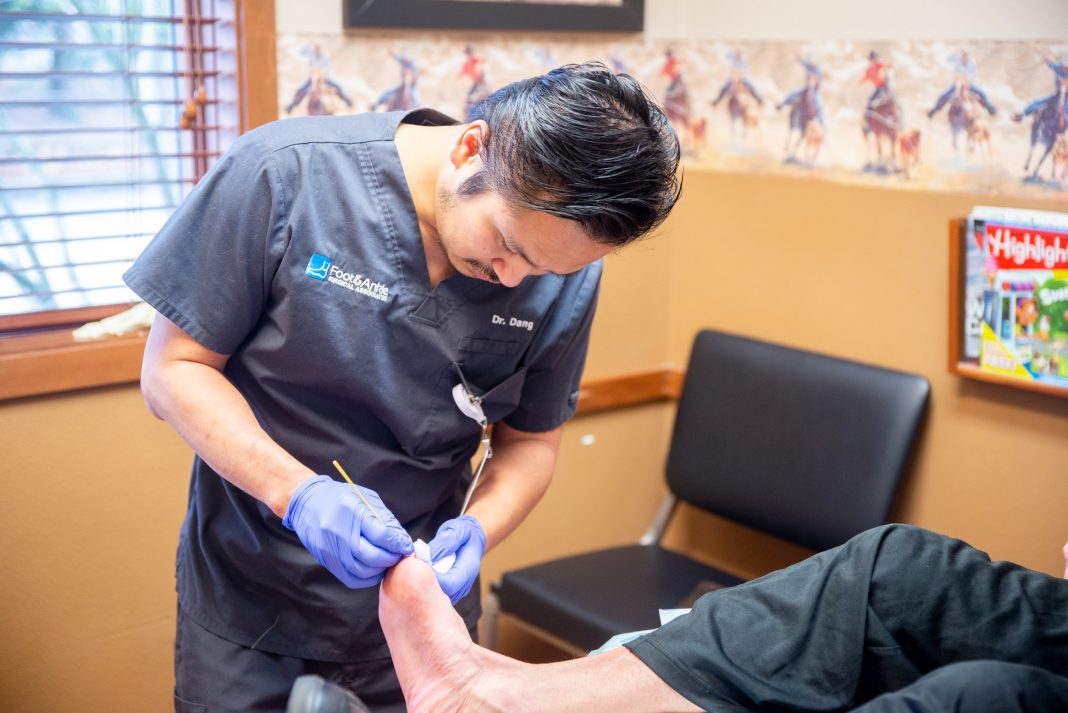November is Diabetes Awareness Month and for Foot & Ankle Surgical Associates, it is an opportunity to speak with patients about the importance of foot care and an overall healthy lifestyle, not just in November, but all year round. For providers, it’s a time to speak about diabetes maintenance and prevention, including regular foot care, to decrease the chance of potentially serious complications in the long term.

Photo courtesy: Foot & Ankle Surgical Associates
Although diabetes is a condition usually associated with blood sugar levels, diabetes can also affect the foot and ankle, according to Dr. Huy Dang, DPM a podiatric physician at Foot & Ankle Surgical Associates.
“My thought process with Diabetes Awareness Month is if you are diabetic, things to make sure we are checking for is foot and ankle cuts, legions, problems with that,” says Dang. “Making sure that you see your doctor on a regular basis to bring your blood sugars down through diet and medication to avoid these long term affects.”
Diabetes is a condition that is classified into two types. Type 1 diabetes, also known as insulin-dependent diabetes, is usually diagnosed in children and adolescents. Type 2 diabetes is typically acquired later in life. Although occurring at different rates, Dang says both types of diabetes, if not managed, can lead to health complications, including extensive neuropathy, which is the loss of sensation in the limbs.
This is a dangerous condition, because with the loss of sensation also comes with the loss of feeling pain.“You don’t know when you get injured or when you get ulcers or when you get infections,” explains Dang. “So, there will even be times where they can fracture a bone and they’ll never know about it.”
Uncontrolled diabetes has serious long-term implications because high blood sugar can damage nerve endings and blood vessels. This could lead to not just neuropathy, but also a condition called peripheral vascular disease.

“The diabetics with the highest complication rates fall into two categories, which is diabetes with neuropathy and diabetes with peripheral vascular disease,” explains Dang. “Because any time you get a cut, it can become infected or you’ll never feel it and it will just keep on getting worse and worse. People without neuropathy would feel that. They’d stop walking to pull a rock out of their shoe. Diabetics who have neuropathy don’t. If you couple that with peripheral vascular disease, now you have an open wound that can’t heal, because you don’t have enough blood flow going to that area, so your amputation rates skyrocket.”
In addition, unmanaged diabetes can create complications of the gastrointestinal tract, heart and eyes, as well as issues in the foot and ankle. To avoid complications from diabetes Dang says it is important for people who are diabetic to work with medical professionals, like doctors and dieticians, to find the right balance of lifestyle changes and medication.
“Diabetes Awareness Month is being aware of diabetes and what you need to help control it,” says Dang. “A lot of people talk about it and say they’re just going to go on this pill. It’s about changing your life around and taking it seriously. Changing your diet so it can be better controlled, so those pills work better. When people just rely on pills, it doesn’t work as well.”
Adopting a healthy lifestyle that includes a balanced diet and exercise is also an important factor preventing not just complications, but also preventing the onset of diabetes itself.
“That’s really important, making sure that you have a healthy mindset so that it doesn’t worsen,” explains Dang. “One of the reasons why we have such high diabetes rates in the United States is because we have plenty of food. It’s not a bad thing, it’s a very good thing to have that, but understanding it’s in moderation and making sure we do not overindulge now so we don’t have to pay for things later.”

Dang adds that although diabetes is a serious medical condition with potential complications, it is a condition that is treatable and with a proactive management or prevention plan, the condition doesn’t have to lead to long-term complications.
“I think the lifestyle changes idea is really good because people understand they can do this, they can progress though this,” explains Dang. “It’s not an end stage disease. It’s something we can change and something we can make better and we can avoid a bigger complication risk. And even people who are not diabetic, it’s good to make these lifestyle changes so you don’t become diabetic.”
To learn more about diabetes foot care, visit the Foot & Ankle Surgical Associates website.
Sponsored

















































